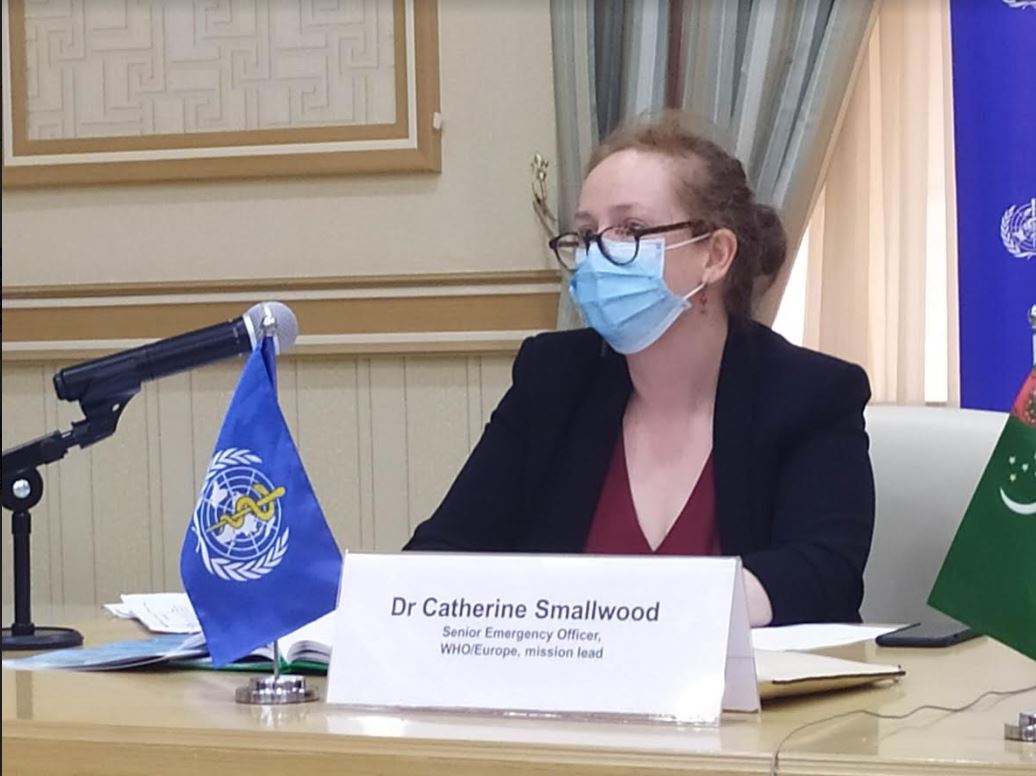Ashgabat, Turkmenistan, 15 July 2020
Dr Catherine Smallwood, Senior Emergency Officer, WHO Regional Office for Europe, mission lead
Good afternoon everybody and special thanks to the government of Turkmenistan for inviting a WHO mission to the country.
As you know, the team arrived in Turkmenistan on 6 July, after overcoming complex logistic challenges jointly with the Turkmen government that delayed our expected arrival.
The Ministry of Health and the Ministry of Foreign Affairs made all arrangements for the team to get here. With their support we visited hospitals, public health centers, laboratories, and three border crossings including the international seaport in Turkemenbashi. I am very grateful for that.
During this time, we have been working together to identify the best actions to prevent the spread of COVID-19 in Turkmenistan, also based on the experience from other countries.
Observations
To date, Turkmenistan has not reported any confirmed cases of COVID-19. Based on what the team was able to observe, the country fully recognizes the risk currently posed by the virus, and efforts to get ready to respond to COVID-19 transmission in the country are underway.
We commend the recent activation of stronger measures to prevent the transmission of respiratory infections and protect the health of the people, including at mass gatherings, markets, shops and on public transport.
New restrictions are in place for domestic travel between regions by bus and train. And individual prevention measures are in place including the use of face masks, hand hygiene, and maintaining physical distancing.
Earlier this year, Turkmenistan established a national multi-sectoral COVID-19 task force; approved a COVID-19 Preparedness and Response Plan; and developed COVID-19 guidelines for prevention, diagnosis and treatment. These are all important steps.
Recommendations
WHO advises activating the critical public health measures in Turkmenistan, as if COVID-19 was circulating. This includes identifying persons with acute respiratory infections, isolating and testing them early, tracing their contacts and caring for the sick. These are the cornerstones of response to COVID-19.
WHO also expects, in line with all countries’ rights and obligations under the International Health Regulations, that any unusual or unexpected public health events are reported to WHO, regardless of the origin or the source.
We are aware and concerned about reports of increased cases of acute respiratory disease or pneumonia of unknown cause; therefore, we recommend that surveillance and testing systems are scaled up, and that samples are sent to WHO reference laboratories for confirmed testing, as most countries have been doing in early stages of their outbreaks.
The health system in Turkmenistan is equipped to respond to COVID-19. We advise further strengthening it across the entire country, activating contingency plans to enable Turkmenistan’s health infrastructure to cope with any rapid surge in cases. Continuously training health care workers and protecting them is an essential part of this.
The community is an integral part of all response efforts. Information on risks and what protective measures are introduced and their intended duration, as well as regular accurate health advice need to be clearly communicated, considering people’s perceptions and concerns, and empowering people to protect their health, and the health of their families.
Conclusions
Stopping this virus requires the participation of everyone – the government at all levels, the civil society and the community. Let me conclude by saying:
- now is the time to build on the efforts taken so far, scale them up and expand testing of acute respiratory infections and COVD-19 suspect cases;
- now is the time to further prepare all health facilities and health professionals for patients with COVID-19;
- now is the time to engage the community in the response;
- now is the time to expand significant multi-sector preparedness efforts to build a response.
The actions taken in Turkmenistan will have impact for the people in the country, but also throughout Central Asia, Europe and the world.





Comments